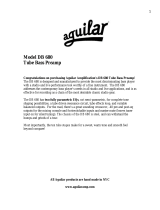Page is loading ...

1
Model DB 659
Tube Bass Preamp
Congratulations on purchasing Aguilar Amplification’s DB 659 Tube Bass
Preamp! The DB 659 is a warm and full sounding preamp. It is lightweight and
fills only one rack-space. Although the tone controls are simple and easy to use,
the DB 659 is a versitile unit that sounds great with any style of playing.
In addition to outstanding performance with any active or passive four string bass,
the DB 659 will musically and accurately reproduce the extended range of modern
five and six string basses.
All Aguilar products are hand made in N.Y.C.
www.aguilaramp.com

2
Specifications:
Noise: >-80 db (unweighted)
Fuses: One external 1/4 amp slo-blo for 100 - 120 volt operation
(One 1/8 amp slo-blo for 220 - 240 VAC operation).
Preamp tubes: Two 12 AX7WA’s.
Power supply: Regulated high voltage plate supply, regulated filament supply for lowest
noise.
Outputs: Two unbalanced ¼” outputs, one balanced output with a Jensen
transformer.
Inputs: One active input 39K ohm, one passive input/1meg ohm.
EFX Send: Variable send level.
EFX Return: One return with –20 db to 0 db compatibility.
Weight: 6 lbs.
Chassis: Aluminum construction provides sturdiness without excessive
Weight.
Components and workmanship: Only the highest quality components and workmanship are
used in Aguilar products.
Warranty: Ten Year Limited Warranty!
Features:

3
Active/Passive inputs:
Start by using the passive input. If your bass’s output distorts the input section, switch to the
active position. In the active input, a 12 db pad in the signal path will remedy the situation.
Volume pot:
This pot controls the gain of the preamp section. Clean sounds are usually achieved by setting the
input gain around 11 or 12 o’clock. A little bit of musical distortion will occur if set past one or
two o’clock.
Equalization:
Treble:
Tube driven shelving type, boosts up to 12 db. The center frequency is set at 4 kHz.
Bass:
Tube driven shelving type, boosts up to 12 db. The center frequency is set at 40 Hz.
Midrange:
Tube driven shelving centered at 400 Hz.
Deep Switch:
The deep switch adds 3db of broadband boost at 30 Hz.
Bright Switch:
This switch is passive RC pre-emphasis circuit at 5-7 kHz. The bright switch will add a brighter
timbre to the entire range of your bass.
Effects Loop:
The Send pot is push/pull for line or instrument level. This allows you to use a studio effects unit
(line level) or a stomp box (requires instrument level) in the FX loop. Adjust the amount of send
so as to get maximum performance from your effects unit. Don’t give the FX so much level as to
overdrive it.
The parallel/series pot is push/pull for parallel or series operation. In the parallel mode affected
signals are mixed to the dry sound. In series mode the entire sound of your bass is processed by
the effects in the loop. The amount of effects can be adjusted with the return pot. If you pull the
return pot out for series operation without any effects plugged in the loop, the loop will be open
and no sound will result.
Master Output Control:
This pot controls the output level to your power amp.

4
OUTPUT INTERFACES:
Rear Panel:
XLR Balanced Output:
Use the –40db pre-eq setting in a concert situation where the house mixer is taking a signal into
the house-mixing console. The house mixer is now getting his feed after the preamp stage, but
can use appropriate eq for the venue. The eq on stage will still be controlled by your settings. If
the house mixer wants your eq settings included in the mix, set the control to –40 post eq. The –
40 level is correct output level for going into a preamp on a mixer. Our balanced output uses the
highest quality Jensen output transformer. If you hear any ground noise, change the position of
the ground lift switch under the output.
¼” unbalanced outputs:
Two full-range mono outputs are provided for connection to your power amp.
FX Send:
Connect the input of your effects unit to this output.
FX Return:
Connect the output of your effects unit to this input.

5
Limited Warranty
Aguilar Amplification’s DB 659 tube preamp is warranted to the original owner for a
period of ten years from the date of purchase against defects in materials and
workmanship. Tubes are covered by the warranty for a period of six months.
The warranty period starts from the date of purchase from an authorized Aguilar dealer.
Your sales slip or purchase invoice is necessary for warranty service.
Before sending your unit to Aguilar for repair, you must receive a return authorization
number from us. Contact us via phone, fax, or email (
with a description of the problem. We will then issue to you a return authorization
number.
You are responsible for all shipping charges. You must ship the unit to us freight
prepaid. We will return the unit to you freight collect. If the unit is being sent from
outside the United States you will also be responsible for customs brokerage, if
applicable. Please check with your freight forwarder for assistance.
Aguilar Amplification LLC is not responsible for shipping damage, either to or from our
service center. Claims must be filed with the carrier.
The only company authorized to perform work under this warranty is Aguilar
Amplification LLC of New York, NY.
/







